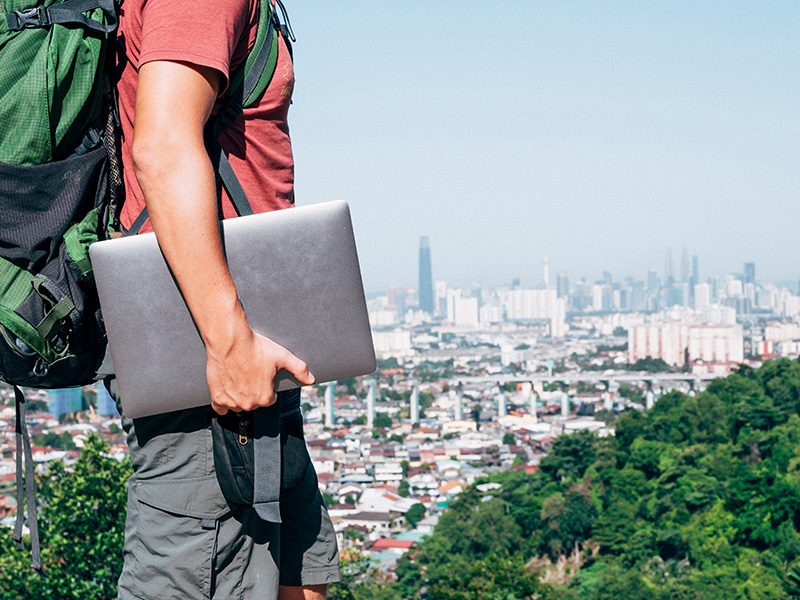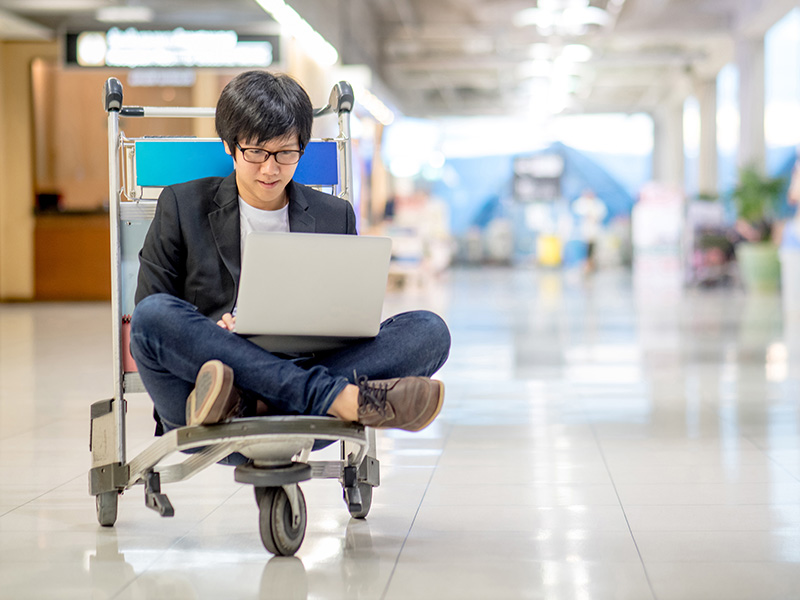
There’s never been a better time in history to hit the road, and take your work with you. Between the rise of the gig economy, remote job offerings, and the availability of short-term rentals, more and more workers are combining employment with travel.
Calling in for a meeting from Peru? In this new era, no one seems to mind as long as you keep up with your work.
Not quite sure what this all means – or how you might get started in this bold new lifestyle? Keep reading for our FAQs, tips, and advice on what the trend is all about and how to become a digital nomad yourself.
Q: What is a digital nomad?
A: First things first: a digital nomad is a person who uses technology in order to work remotely. And remote can mean anywhere. A beach in France, a cabin in Canada, or a tiny studio apartment in midtown Manhattan. Anywhere with a strong WiFi signal and a place to put your laptop will suffice, as long as either your employer and/or your clients have OK’ed you working from afar for at least part of the time.
Q: What are the best cities for digital nomads?
A: When it comes to picking where you want to set up shop, think long and hard about exactly what you want to get out of digital nomadism. Do you want to explore a new city and meet new people? Or do you want relative solitude so you can focus intently on your work? Maybe something in between.
We asked Castle Searcy, a creative strategist from Denver who’s been living the digital nomad lifestyle for the last two years, for her advice. She told us,
“Pick a city based on your interests and what you want to experience while you’re there. I’m a creative so I choose cities with good art scenes, but other people might be into food or surfing or history. Whatever your scene – professionally and personally – find the city that matches it. And wherever you choose, make sure it’s got a good and easily accessible airport.”
Q: How should I prepare to become a digital nomad?
A: If you’re itching to hit the road, and have enough work lined up to sustain you as a digital nomad for at least a month or two, it’s time to determine how long you think you’ll be gone and if you want to rent out your home. Many digital nomads keep their apartments or houses in their main locations by putting them on the market as short-term, furnished rentals.

In those cases, time is of the essence. Plan to start prepping your home for guests, moving valuables and personal items into a self-storage unit, and listing your place online at least a month before you want to head out of town. (Check out our recent blog post Home Staging Tips to Create the Perfect Rental or House Swap for more tips and how to’s.)
Q: How should I find work?
A: With more than 25% of U.S.-based employees working remotely, there has never been more opportunity to find a job option that suits your travel lust. If you’ve already got a job that you like, your first step is to figure out how to make it work remotely and then pitch it to your boss. If you’re a freelancer, visit sites like Upwork, Fiverr, and TaskRabbit to find short-term gig work to keep the lights on while you’re far from home. Alternatively, you could start your own small online business or take a full-time position at a company with a remote workforce. Check out the sites Working Traveler and FlexJobs to find jobs that might suit your particular skillsets and ideal work situation.
Q. How should I find a community?
A: One of the main worries that gets in the way of actually becoming a digital nomad is solitude . It can be hard to imagine pulling up roots and moving to a new area in the world without a network or community on which to rely. But getting out and making new connections is as easy as pursuing the activities you enjoy and starting conversations with likeminded people. Take an improv class. Volunteer. Find a local restaurant or bar that seems popular. Rent a desk at a co-working spot. Ask friends if they know anyone you can hang out with in your particular location. Join a professional group or sports league. The options are truly limitless.

Perhaps unsurprisingly, you can also find plenty of communities for digital nomads online, including the Digital Nomad subreddit, Digital Nomad World, and Nomad List. These sites can often point you in the direction of meet-ups with likeminded folks in your particular area.
Q: How can I save money when I’m on the road?
A: There are a number of ways to travel cheaply if you’ve got nowhere to report to in the morning. First, install a hot spot on your phone so that you can always have access to good WiFi. This alone will make delays much more tolerable. Second, book your flights through connecting cities that offer cheaper fares than flying directly. You can even plan to leave the airport and spend the day exploring or working at a coffee shop. Third, only pack a carry-on. (Wear your heaviest clothes and shoes to the airport.) Fourth, download shows before you travel so you don’t have to buy any entertainment options on the plane. Fifth, find low-cost, flexible self-storage spaces to keep your belongings when you’re out of town in both your host city and your home city.
Q: Any more tips on the digital nomad lifestyle?
A: One of Castle’s biggest tips is to back up your computer in several different places (on a hard drive and in the cloud) and make sure your charging game is on point. She says to invest in back-up batteries or power banks for your laptop and phone. It’s also a good idea to buy noise-cancelling headphones. Between those, your hotspot and your extra batteries, any place can be a workplace – which is the trick when you’re traveling.

Before COVID-19, becoming a digital nomad was something that most people could only dream of. Today, it’s a reality for millions of Americans – with the full support of their companies and clients.
If you’re on the fence, consider this: according to a recent study, 85% of digital nomads report being highly satisfied with their work and lifestyle. It’s nice to know that there are other career options for you and your lifestyle. And if you decide to hit the road, check out our storage units near you for flexible month to month lease options.










